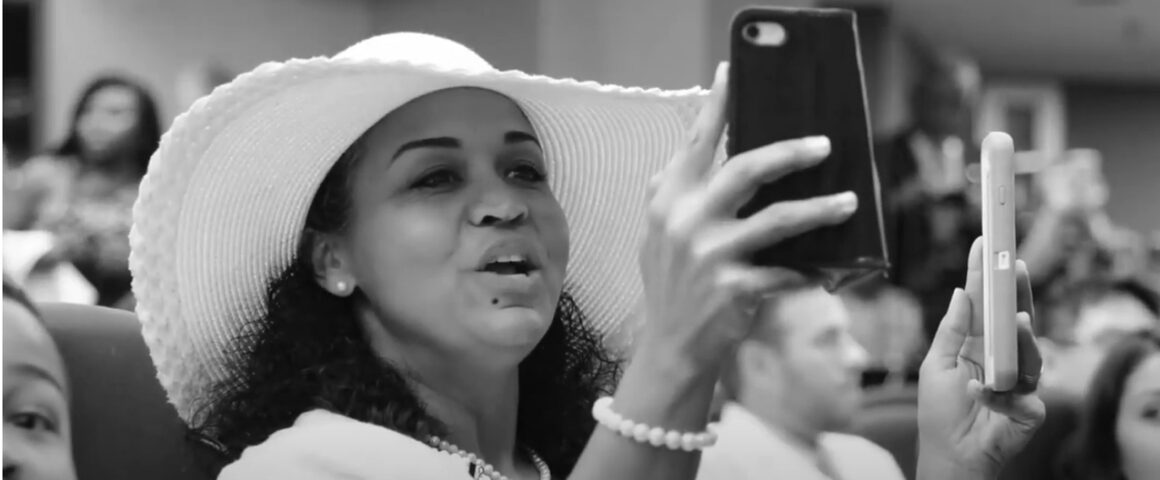“The time is out of joint. O cursèd spite, That ever I was born to set it right!” — William Shakespeare, Hamlet, Act 1, Scene 5
According to the United States Sentencing Commission, the incarceration rate for blacks in the U.S. is over five times higher than whites. In addition, Black male offenders receive sentences that are on average 19.1 percent longer than whites. In Georgia and Louisiana, the proportion of Blacks serving life sentences without possibility of parole is as high as 73.9 and 73.3 percent, respectively. While these statistics tell a story of racial inequality, what they do not reveal is the human cost on families left behind. Winner of the Sundance Award for Best Director, Garrett Bradley’s (“Cover Me”) stunning documentary, Time, shows the human cost on a Black family in Louisiana coping with the absence of husband and father of six boys, Robert Richardson, sentenced to 60-years in prison for the attempted robbery of a credit union.
Using home videos and archival footage edited by Gabriel Rhodes (“And We Go Green”), the film takes place over a period of 20 years and, as one boy declares, “time is loss . . . time flies.” Describing the film’s title, Bradley says that “Time is abstract. The word itself can elicit many meanings, symbols, and practicalities.” The passage of time in the film, however, as shown in the videos compiled by wife and mother, Sybil Fox Richardson — known as Fox Rich, reflects the boys’ growth from childhood to young adults, an entire life without having ever known what it means to have a father.
Left with empty spaces and a cardboard cutout of their father hanging on the wall, their house is filled with a constant reminder of the missing piece, the empty chair at the table and the space in the passenger’s seat in the family car. The absence of the father, however, did not quell the family’s optimism or their determination to have Robert released from his draconian prison sentence. Even more importantly, it did not diminish the love they felt for each other. As an accomplice, Sybil served only three and one half years as a result of a plea bargain. Although a similar deal was offered to Robert, it was withdrawn and the maximum sentence was imposed, even though it was his first offense and there was no violence involved.
The film, shot in black and white by cinematographers Zac Manuel (“Buckjumping”), Justin Zweifach (“Trial by Media”) and Nisa East (“Holy Denver”), is basically Fox’s story and her growth from a self-doubting and insecure young woman to an eloquent advocate for criminal justice reform. In her 2009 memoir, “The One That Got Away: A True Story of Personal Transformation,” she relates her move to New Orleans to be closer to Robert and her campaigning for prison reform in schools, churches, and community gatherings. We also follow her business career as an owner of a car dealership in New Orleans as well as being a motivational speaker.
Employing a non-linear narrative with numerous flashbacks, Time depicts scenes of childhood in kindergarten where the twins (Freedom and Justus) talk about Freedom’s “student of the month” award, the celebration of birthdays, a visit to an amusement park, and the boys’ development into college students pursuing a professional career. Unlike typical stereotypical images of young black males, the boys are shown as complex human beings with a unique ability to set reachable goals for themselves and articulate their feelings. Set to the poetic score of now 96-year-old Ethiopian nun and pianist Emahoy Tsegué-Maryam Guèbrou, the viewer is immersed in the family’s struggle.
According to Bradley, “I wanted the film to feel like a river, and not like a collage, and the music helped reinforce that idea and intention. Describing Guèbrou’s music, Bradley s says “I like how open-ended time can be. Emahoy’s music is radically pointed. She frames her own sense of time; she molds it to her liking.” Though Fox maintains her composure throughout, there is a sense of determination about her, a certainty that she will not quit until she can greet her husband walking out of prison. Her fight is one to make sure the family stays together, even after twenty years of frustration. Some of the footage depicts Fox’s numerous phone calls to the judge’s assistant seeking information which is usually not available.
Fox’s tone is one of restraint and courtesy, yet it is clear that she hides her frustration about the unresponsiveness and insensitivity of the justice system. She is a fighter, however. As Bradley describes it, “I loved the spiritual connection of what it means to be a strong Black woman and to work within and outside of the constraints and parameters that the world gives you. To find yourself and remain an individual and to ensure that there’s nuance in your life within those realities.” Time is not a film only about prison reform but also about the enduring bonds of love, one that grew in strength over the years. As Nobel Prize-winning poet Derek Walcott expressed it, “Break a vase, and the love that reassembles the fragments is stronger than that love which took its symmetry for granted when it was whole.”




'Movie Review: Time (2020)' has no comments